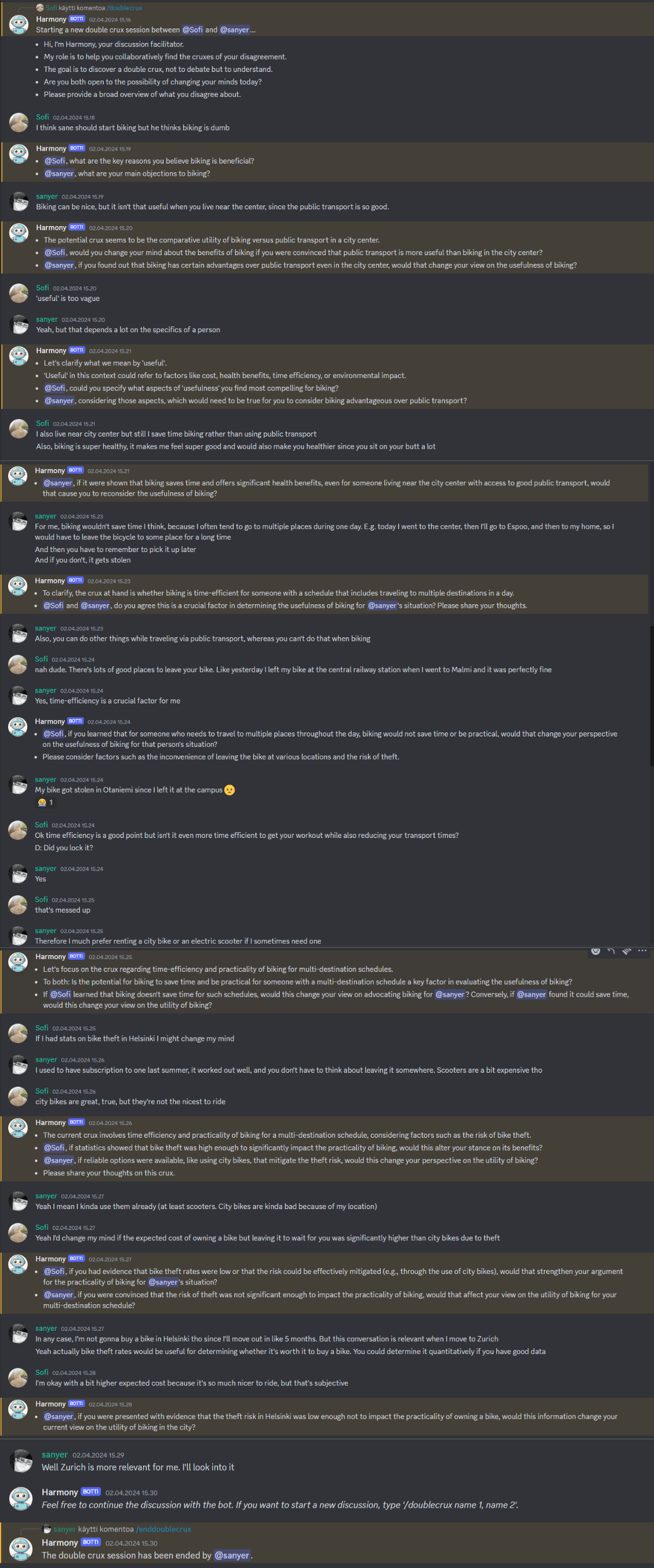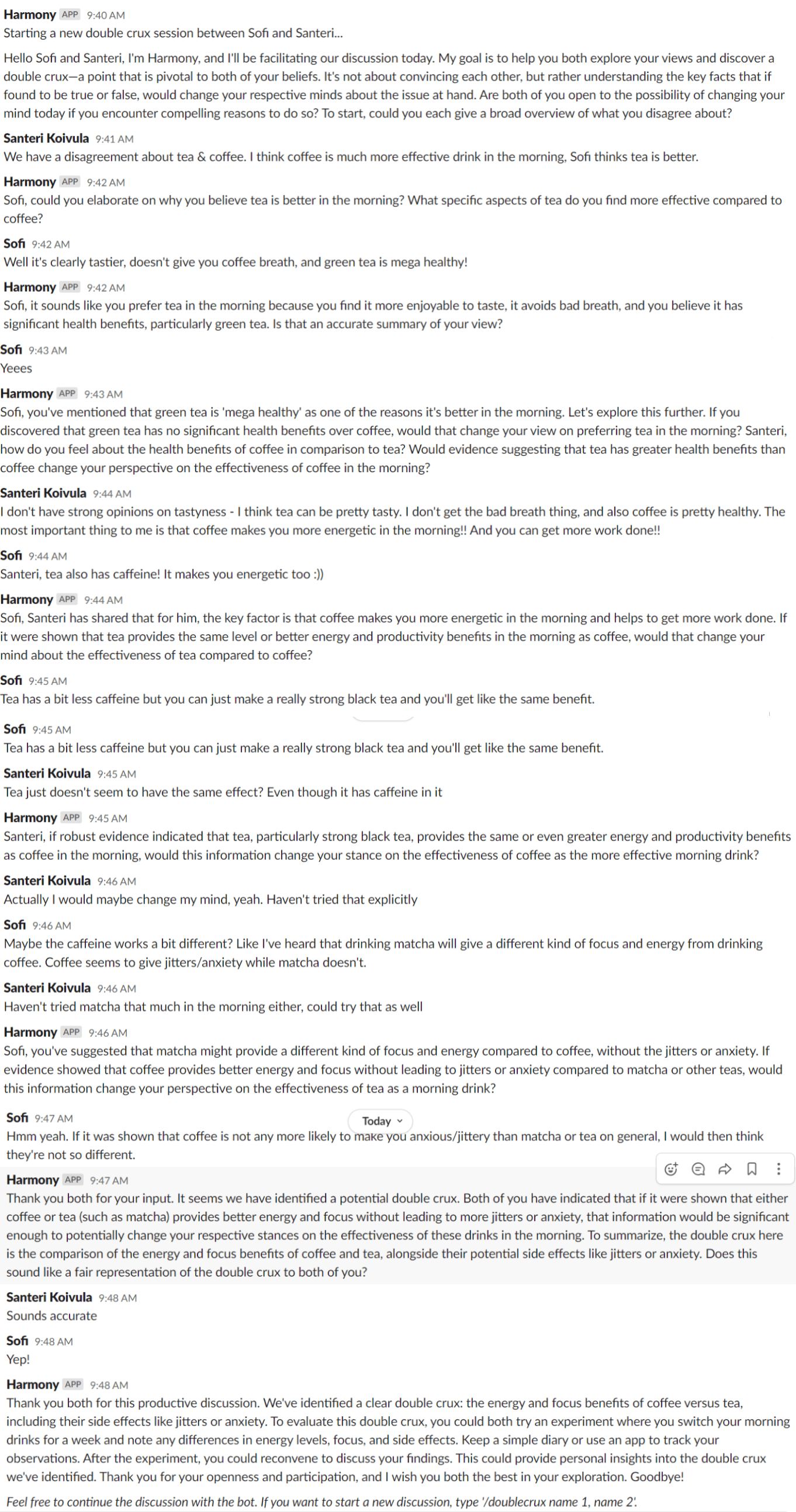Cool that you published this! Could you post some example dialogues with the bot that you think went particularly well?
Say you and your co-worker disagree about whether you should create a code of conduct policy for your organization. One of you is strongly against it, and the other one is strongly for it. Despite rehashing your reasoning multiple times, you cannot reach an agreement. The bot might help you to understand that your co-worker thinks a code of conduct policy might be counterproductive if it isn’t enforced well, whereas you think that, even without enforcement, it has a positive net effect on overall culture. The double crux here might be whether conduct policies require enforcement.
The double crux bot is intended to help resolve these types of action-oriented disagreements.
The bot is not as useful for conversations that are about:
- conflicting needs or interests, rather than factual agreements.
- personal ethics and values.
These two quoted parts (the example scenario, and the disclaimer) seem to me to be in direct contradiction to each other.
I can see why you think it would be contradictory. The idea in the example was that both of you want better working environment in your workplace, but you have different opinions on how to get there. Whereas the disclaimers were about situations where this is not the case. For example, a situation where the other person doesn't care about a safe working environment. Does that make it clearer?
We are probably going to change the example if it's unclear though
Cool idea and congrats on shipping! Installed it now and am trying it. One user feedback is I found the having-to-wait for replies a bit frictiony. Maybe you could stream responses in chunks? (I did for a gpt-to-slack app once. You just can't do letter-by-letter because you'll be rate limited).
Is there a version of this bot (or something similar) that one can use in an LLM model or website? I want to use this on a podcast without having to link this to a Slack
Is your goal to identify double-cruxes in a podcast? If so, our tool might not be the best for that, since it's supposed to be used in live conversations as a kind of a mediator. Currently, the Double-Crux Bot can only be used either as a bot that you add to your Slack / Discord, or by joining our Discord channel.
Probably more useful for you is this: In a recent hackathon, Tilman Bayer produced a prompt that was used to extract double-cruxes in from a debate. As a model they used Gemini 2.0 Flash Thinking, you can see the prompt here: https://docs.google.com/presentation/d/1Igs6T-elz61xysRCMQmZVX8ysfVX4NgTItwXPnrwrak/edit#slide=id.g33c29319e5a_0_0


Edit (July 18, 2025): While the Double Crux Bot is no longer actively maintained, the code is open-source and available here! We phased out the Heroku deployment for the Discord and Slack bot in May 2025. Thanks to everyone who took part!
Edit (April 2, 2024): You can now join the Double Crux Bot's own Discord server here.
TL;DR:
We are releasing a beta version of our chatbot powered by GPT, designed for facilitating Double Crux dialogues between two users on Slack or Discord. We're hoping to receive user feedback to evaluate the bot's usefulness and further work required. You can get the bot for your Slack workspace here and for your Discord server here.
Introduction
Double Crux is a conflict resolution technique developed for the Center for Applied Rationality (CFAR) workshops, but it can be difficult to use because it might not apply to all problems, conversations can become emotional, or the participants might not have the requisite knowledge to embark on a double crux conversation themselves. Having a facilitator makes it easier, but facilitators aren’t readily available and are pretty much inaccessible outside of defined rationality workshops. There are also widely varying opinions on the best scenarios and strategies for approaching double crux. Our bot provides a low-effort way to engage in double crux for disagreements that people have in real-time, and it systematizes the method to an algorithm we have developed and continue to refine.
Example Scenario
Say you and your co-worker disagree about whether you should create a code of conduct policy for your organization. One of you is strongly against it, and the other one is strongly for it. Despite rehashing your reasoning multiple times, you cannot reach an agreement. The bot might help you to understand that your co-worker thinks a code of conduct policy might be counterproductive if it isn't enforced well, whereas you think that, even without enforcement, it has a positive net effect on overall culture. The double crux here might be whether conduct policies require enforcement.
The double crux bot is intended to help resolve these types of action-oriented disagreements. The bot helps people make their reasoning explicit and reflect on the crux of the issue. The bot helps people build better inferences about each other’s motivations and frameworks so that they can come to a resolution by addressing those key points upon which most of the decision-making hinges. The chatbot does not let people negotiate or outline the solution itself but instead helps to lay the foundation for doing so.
The Double Crux Algorithm
Double crux has been introduced previously on the forum. Here is an outline of the process and some of its caveats. There is another explanation from the CFAR handbook here. Here is the basic conversational pattern with a facilitator that we drew a lot of inspiration from. Rehashing these explanations seems redundant, so we avoid doing that.
The general scheme (similar to how it was explained to the chatbot): Say there is a scenario where Participant A holds Belief A, while Participant B thinks Belief A is false. Participant B’s belief is Belief B = ¬Belief A. The goal is to find a crux such that if Participant A believed the crux were true, they would meaningfully update Belief A (i.e. reverse their belief or greatly change their confidence in it). If Participant B believed the crux to be false, they would update their belief, Belief B.
Use Cases
The bot works best for conversations where the participants are trying to build something together and they have an intangible disagreement about the thing they are building. Examples of this include:
The bot is not as useful for conversations that are about:
Using the Bot
The bot is currently in open beta in Slack and Discord.
You can start a double crux session with '/doublecrux' and then the names of the two participants. Use '/enddoublecrux' if you want to end the active session.
The bot is open-source, and you're free to host the bot yourself if you choose. If you do, we'd love to hear from you. The GitHub page of the project can be found here.
The privacy policy can be found here.
Contact & Feedback
Note that the bot is still in development, so expect potential bugs, downtime, and resets. However, we're committed to ensuring the beta phase is as functional as possible. We rely on user feedback to improve the bot.
You can reach us at doublecrux@epistea.org if you encounter confusion or have questions regarding the project.
Acknowledgments
This project was part of the Epistea Residency 2023. We would like to thank all of our mentors, teachers, friends, and funders. These include: